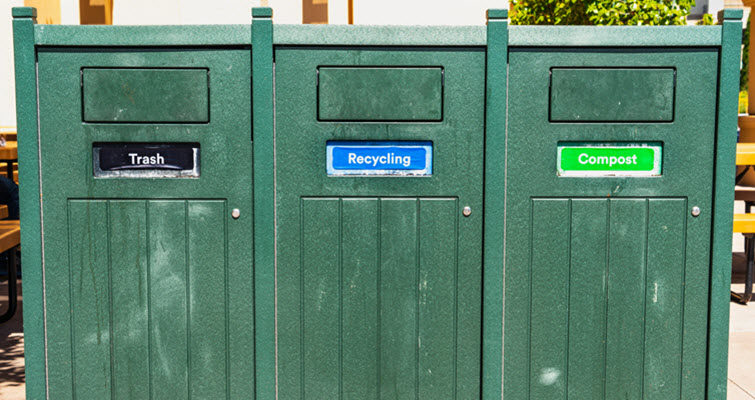In the whirlwind of joy and festivity at our favorite gatherings, the less glamorous side often goes unnoticed—the aftermath of waste left behind. Festivals, while they are fun celebrations, can also be a hotspot for environmental strain.
But fear not! With conscious choices and strategic planning, managing festival waste can be more efficient and eco-friendly than ever before. Let’s dive into some effective tips that can make a monumental difference in minimizing the environmental impact of these celebratory extravaganzas.
Embrace Eco-Friendly Alternatives
The cornerstone of waste management at festivals lies in the choices made beforehand. Opting for eco-friendly alternatives can significantly reduce the volume of waste generated. Encourage vendors and participants to use biodegradable or compostable materials for packaging and serving food and beverages.
Replace single-use plastics with sustainable options like bamboo cutlery, compostable plates, and recyclable cups. Providing recycling stations with clear instructions on proper waste segregation empowers attendees to actively participate in waste reduction.
Implement Efficient Waste Collection Strategies
An effective waste collection strategy is pivotal in managing festival waste. Deploying clearly marked bins for different types of waste—recyclables, compostables, and general waste—helps in streamlining the disposal process.
Encourage waste sorting by appointing volunteers or employing staff dedicated to guiding attendees on proper waste disposal practices. Regular waste collection rounds throughout the event ensure that overflowing bins don’t lead to indiscriminate dumping, maintain cleanliness, and reduce the environmental footprint.
- Strategically Placed and Well-Managed Bins: The placement of bins throughout the festival grounds plays a pivotal role in waste management. Strategically position bins in high-traffic areas, food courts, and entertainment zones. Clear signage and color-coded bins aid in simplifying waste disposal for attendees. Ensure a proportional distribution of bins for recyclables, compostables, and general waste, making it convenient for festival-goers to dispose of their waste responsibly.
- Engaging Attendees through Education: Empowerment through knowledge is key to encouraging responsible waste disposal. Train volunteers or staff members to act as waste management ambassadors. These individuals can engage attendees by providing guidance on which items go into which bins. Interactive demonstrations or mini-workshops on waste sorting techniques can be conducted intermittently, encouraging participation and reinforcing the importance of segregation.
- Real-Time Monitoring and Adjustment: Continuous monitoring of waste disposal areas is crucial to prevent overflow and ensure proper waste segregation. Designate a team responsible for monitoring the filling levels of different bins throughout the festival. Based on real-time data, they can rearrange resources, add extra bins where needed, or adjust waste collection schedules to prevent overflowing bins and potential littering.
- Collaborate with Local Waste Management Services: Partnering with local waste management services can significantly enhance the efficiency of waste collection. Collaborate with these services to establish a comprehensive waste management plan tailored to the festival’s scale and needs. Local waste management companies often have the infrastructure and expertise to handle different types of waste sustainably, including recycling and composting facilities.
- Post-Event Evaluation and Feedback: After the festival, conduct a comprehensive evaluation of waste management efforts. Analyze data on waste collected, recycling rates, and any issues encountered during the process. Gather feedback from attendees, volunteers, and staff to identify areas for improvement. This information is invaluable in refining strategies for future events, ensuring a continual evolution towards more sustainable waste management practices.
Implementing these refined waste collection strategies not only enhances the efficiency of waste disposal but also fosters a culture of environmental responsibility among festival attendees. Through proactive measures, education, and collaboration, managing festival waste becomes a collective effort towards a greener and more sustainable future.
Prioritize Post-Festival Cleanup
The festivities might end, but the responsibility for waste management persists. Post-festival cleanup plays a vital role in ensuring minimal environmental impact. Organize volunteer-driven cleanup drives to meticulously comb through the venue, picking up any stray waste left behind.
Partnering with local waste management services or recycling facilities facilitates the proper disposal or recycling of collected waste. Initiating a ‘leave no trace’ policy reinforces the importance of accountability among attendees, fostering a culture of environmental consciousness.
BG’s Big Box Service: Pioneering Eco-Conscious Festival Waste Solutions
As we strive for more sustainable practices in managing festival waste, companies like BG’s Big Box Service stand out as pioneers in environmentally conscious waste management solutions. BG’s Big Box Service, based in Sun Valley, CA, excels in providing comprehensive waste disposal services that align with sustainability goals. Our commitment to eco-friendly practices and innovative waste management solutions has made us a frontrunner in the industry.
BG’s Big Box Service offers tailored waste management solutions, including recycling services, debris removal, and dumpster rentals, designed to meet diverse needs while prioritizing environmental sustainability. With our expertise and dedication, we ensure that waste generated from festivals or events is managed efficiently, minimizing environmental impact.
Ready to take the leap towards a greener festival experience? Partner with BG’s Big Box Service and witness a seamless integration of sustainability into your event waste management.
In the pursuit of managing festival waste responsibly, every small effort counts. Implementing these tips not only contributes to a cleaner event but also fosters a collective commitment towards preserving our planet. Let’s celebrate in harmony with nature and leave a positive footprint for future festivities.



